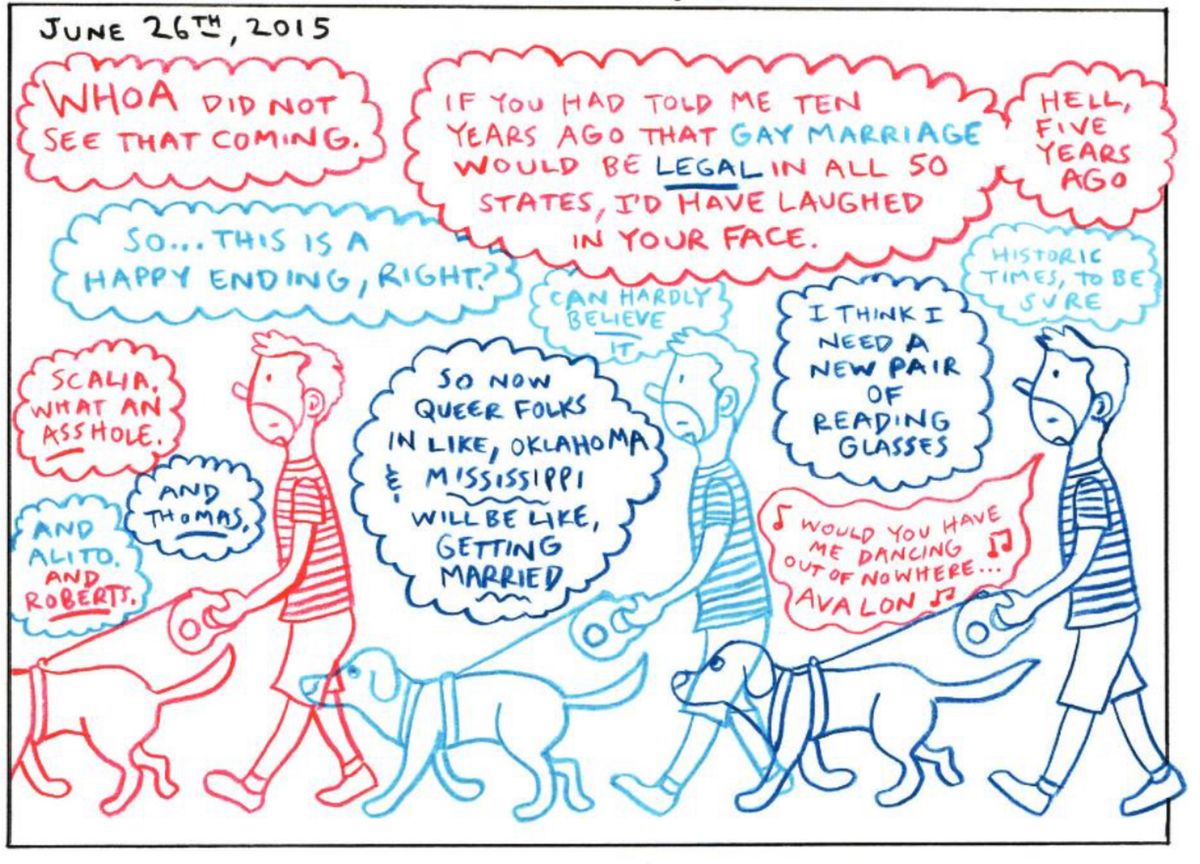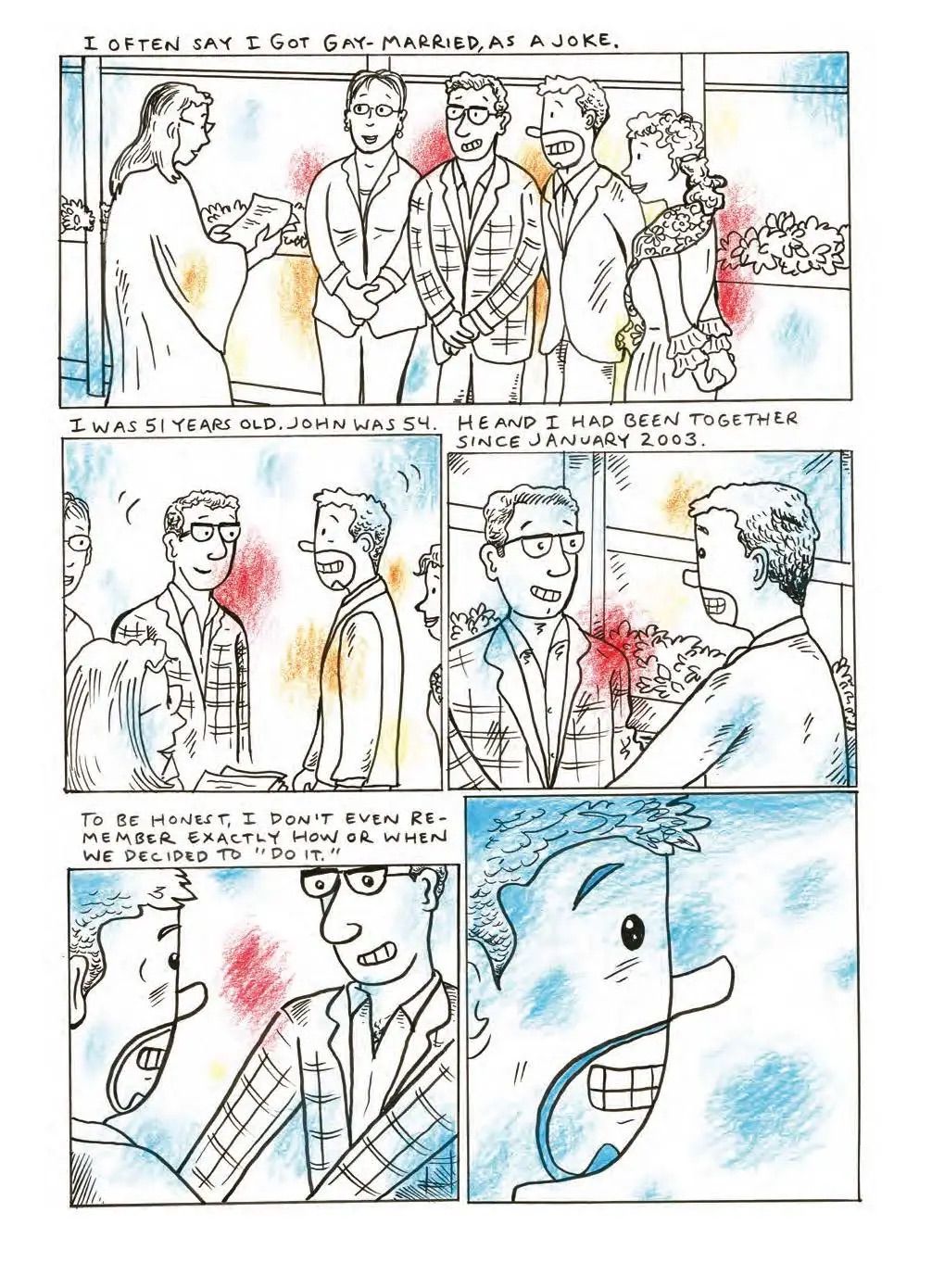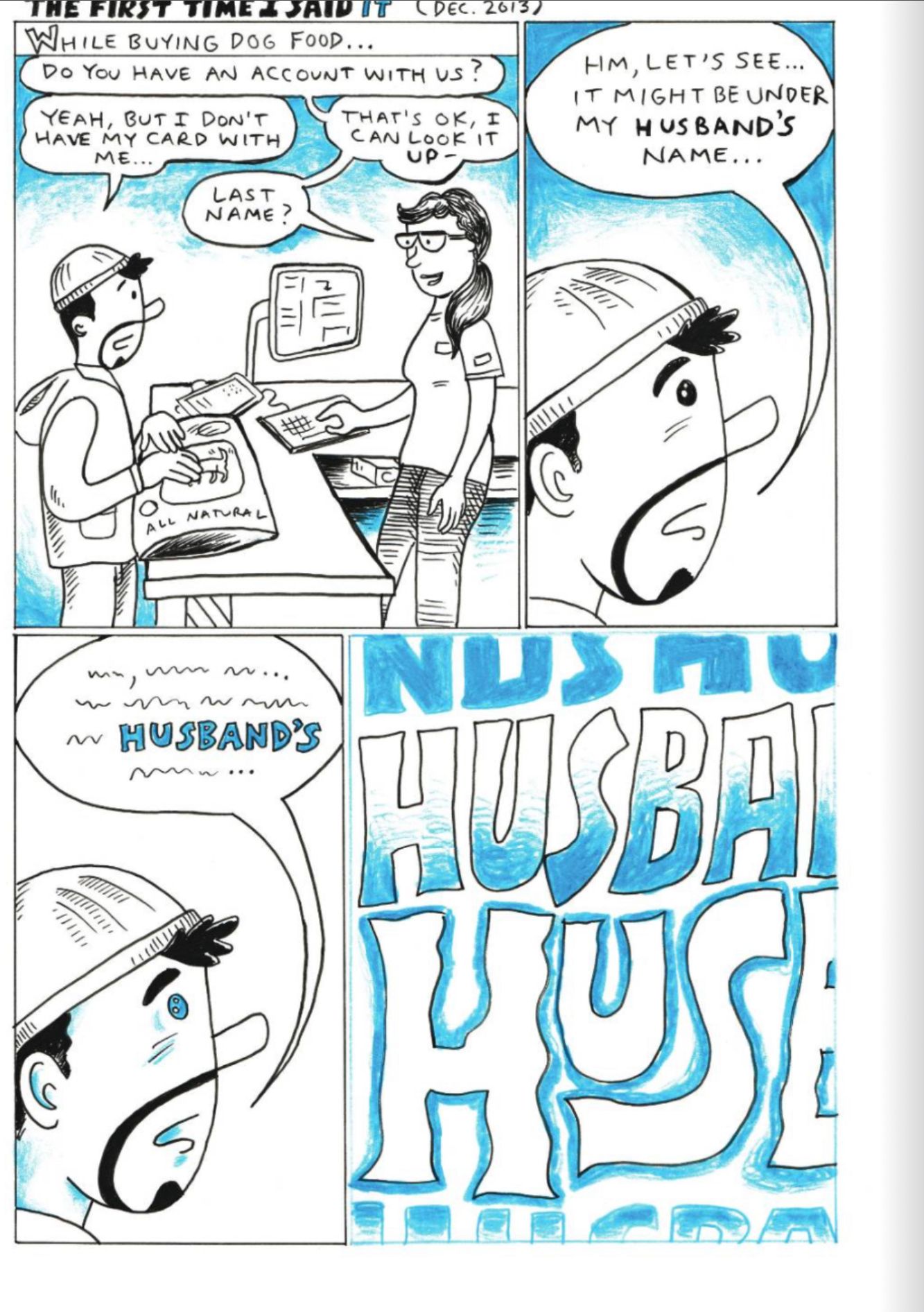Getting the same tax breaks as the heterosexuals- a look at Rob Kirby's Marry Me a Little
Rob Kirby's “Marry Me a Little” Sheds Light on the Daily Struggles of Queer Identity in America.

Rob Kirby’s new book is a quiet little affair chronicling his 2013 marriage to his longtime boyfriend John. Marry Me A Little fights the temptation to make this a “gay marriage” story and instead tells about the marriage of two gay men (subtle difference but hang with me a bit here) and what they had to go through to say “I do.” Taking a matter-of-fact approach to his storytelling, Kirby’s storytelling is more fascinated by the meaning of their marriage than the romance and fireworks of it. Don’t mistake this for some great love story; while the two are obviously in love with each other, this isn’t a boy-meets-boy story. By the time the book begins, the two have already been together for 10 years and are essentially all but married. But before the state of Minnesota legalized same-sex marriage in 2013, it was just something that they could only think about in the abstract “maybe one day…” kind of way.
With that historic 2013 vote, it went from a “maybe one day” to “maybe we should do this now” and so they did. Early in the book, Kirby talks about how “unromantic” he can often be accused of being, arguing that it’s more that he doesn’t like cheap sentiment such as you can see all over social media- the showiness of it all. He owns up to not even remembering if one of them proposed to the other. It’s almost like one day they just decided that they were going to get married and that was enough for both of them. Likewise, the book avoids sentimentality and instead focuses on the practical steps two men have to go through to get and even just be married.

Maybe there’s a little passive/aggressive shade being thrown here as well. These are two people in a loving and committed relationship, doing what millions of people do every day. With that, large parts of this book are just looking at the mechanics of getting married, the steps that Rob and John have to take that are the steps that any couple needs to follow to be legally married. Minnesota was incorporated in 1858 and presumably, people have been getting married since then, if not even before then. Yet it wasn’t until 2013 that Rob and John were able to get married. Who do you invite? What do you call your new spouse? Where do you go afterward? What will the clerk say when two men apply to get married?
The book opens with Kirby at a store in December 2013, buying dog food, and having to have the cashier look up his rewards account. A simple enough activity, no? When he asks the cashier to look it up under his husband’s name there’s something in that moment. His husband. Not his wife, a heteronormative expectation. Not even a more general “spouse” or “partner.” “It might be under my husband’s name…”. And even though it’s a couple of months after his marriage, Rob is still dazed thinking about it. And what will the cashier think? It’s not normal, whatever “normal” may be.
There’s something of that encounter that reverberates through the rest of the book. When Kirby gives an overview of the struggle to legalize same-sex marriage, he recalls Kris Perry from the HBO documentary The Case Against 8. Perry was one of four people who challenged a 2008 ban on same-sex marriage in California. At one point in the documentary, she talks about the ways that gay people have to desensitize themselves to get through life. From there, Kirby writes, “You have to come out every single day, everywhere you go and good luck with that because that’s never fun…”
If there’s a core concept to Kirby’s work here, that may be it. That may be what he wants you to take away from Marry Me a Little. Thinking about queer comics, two of the big ones are Alison Bechdel’s Fun Home and Maia Kobabe’s Gender Queer. Those are big, almost loud books because they’re about discovery, revelation, and even self-realization. They’re empowering stories because we see in them the journeys of the cartoonist into their identities. Kirby’s work belongs right there with Bechdel and Kobabe but it’s so different because right from the start, Kirby knows who he is. There’s no journey here of self-realization, just a journey of getting what other people already have with no problems.

On the first read, there was a bit of a letdown getting to the end of the book and not having that climatic moment of the cartoonist having a profound moment. Personally, I was waiting for it and never got it Rob and John’s story is a good story, it’s an important story, and it’s a different kind of gay story. It’s not exploring their coming out or any big emotional thing like that. At least not until you think about the line about having to come out “every single day.” Rob calling John “his husband” the first, the fiftieth, or even the thousandth time must have been huge. It’s such a loaded word coming from a man. But it’s only that because we’ve made it so big in Rob and John’s context. My wife calling me her husband means nothing in the grand scheme of things. But one man calling another man “my husband?” Well, it doesn’t need to mean anything more or less and yet it can mean so much more.
Just think about that for a moment. Rob opening himself up by calling John his husband means so much. One man getting married to another man means so much. All of these little things that so many of us take for granted are things that these two men (and so many other men and women) need to think about every day or else get desensitized to the idea of ever being able to enjoy the privileges that so many of us just assume are normal.
Flipping through the book, Kirby tells it mostly through black-and-white drawings but there are these bursts of colors in almost every panel. Mostly red and blue (with an occasional yellow thrown in for additional flavor,) these colors feel very charged. Think about where you see red and blue being used right now– to identify Republicans and Democrats and their respective ideologies. As Kirby approaches his thoughts of marriage, he’s usually coming at it from a more political perspective, exploring what same-sex marriage means when it’s a government that has to license it. There are the more religious and conservative underpinnings to it but Kirby is exploring the civil side of marriage. His colors are deliberate but rarely are they political.
He’s almost reclaiming the colors, reestablishing an equilibrium between them. Red and blue don’t need to mean conservative and liberal, especially in a gay story. It’s lovely to see how Kirby puts in these splashes of color to show emotion, punctuate a moment, or to even create depth in his art. The colors become an element of the storytelling, charged with meaning but used counterintuitively to any preconceived meaning.
Even with all of that said, there are distinct political overtones to this story, particularly the end of the book last it looks forward to an uncertain future as the Republican party looks to strip away rights from people. Returning to the idea of having to come out every day, there’s also the worrying every day about always having to fight for the rights that other people have. Rob, John, and so many other people have to think about what the power of the Republicans will and won’t do for them. Even after the 2013 ruling in Minnesota that allowed for same-sex marriage in the state, it’s hard not to recognize the attacks our Democracy has endured since at least 2016 and still struggles with today.
Kirby lets us into this glimpse of his and John’s life. It’s so obvious from Kirby’s cartooning just how settled into life these two are, how committed they are to one another whether or not they had a piece of paper saying that they were married. But Kirby also uses this book to write about the uncertainty of same-sex marriage, of what it means to be in one, and of what a loving couple has to deal with daily that so many others don’t need to worry about at all. Marry Me A Little is an important book, helping to show that all aspects of marriage aren’t set in stone and the same for everyone. On top of the same-sex nature of Rob and John’s marriage, Kirby shares his experiences in a universal way, putting all of us in his shoes, knowing just how in love he is but wondering just what marriage even means today.



Comments ()